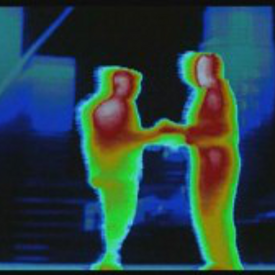Older male (check), glasses (check), white lab coat (check). A scientist! Even without the funny hat or breaker full of red liquid, everyone recognizes the stereotype.
Stereotypes can be based on a nugget of truth and can be useful in situations when there isn’t much time to figure out what’s happening, but they can also be misleading, unnecessary, or even offensive. Moreover, it’s lazy or out of desperation when a writer reaches for a stereotype, and to be avoided when possible. It’s just not interesting! Interest is only engaged when the character goes against stereotype, otherwise the character is merely meeting expectations.
So why do we see so many stereotypical scientists on TV and in movies, and on rarer occasions in books? I already answered this above: laziness or desperation. It’s too much work to draw more than a one-dimensional character, or the fact that this character is a scientist must be immediately recognized in order to fill a small role in the plot. Occasionally stereotypes work well in comedy so they quickly set up the joke without distracting from it, but with the exception of the Big Bang Theory on TV, there doesn’t seem to be a lot of interest in mixing science and comedy. (Check out Brian Malow as a wonderful counterexample, however.)
Where the stereotypes about scientists are valid is that in many fields like physics, there are more men than women. Scientists who work in labs often do wear lab coats. Many do indeed wear glasses, if they’re only safety glasses in the lab. Many do put substance over style and do not prioritize their clothing or hairstyles to be fashionable.
But I’ll tell you, it’s really annoying when you see a scene with an astronomer at an observatory wearing a lab coat, because we don’t do that.
It’s a lot more interesting, as a general rule, to breathe life into scientists and make them unique, just as it is for any character. This also reflects reality. There’s a really great website called “This is what a scientist looks like.” It’s pictures of real scientists. They’re real people and quite varied. Young and old, male and female, glasses and no glasses, with few lab coats in sight. As a contrast, do a google image search for “scientist.” See the difference?
One of my favorite science fiction novels, to a great degree for its depiction of scientists as real people, is Gregory Benford’s Timescape. Check it out.
Any other suggestions for science fiction with interesting scientist characters that go beyond the stereotypes?












Thanks for the insightful comment, Chris.
You're right, science and art seem to go together much more than many realize. In physics/astronomy, the art is usually music. Einstein, for example, was a violinist. Personally, I'm music is not my thing, but I'm a painter and illustrator and thought about a career in art at one point (this is in addition to the fiction writing). And science itself is creative and allows for artistic expression, too, and is a lot less mechanical than often portrayed. Scientists have their own styles.
I'll have to check out LabLit.com, too. Thanks!
I agree with you: popular culture scientist stereotypes are annoying especially when they are used as shorthand for someone with poor social skills, as a set up for a comedic gag, or the one I truly deplore, the evil scientist plot device (see Rosylnn Hayes, "From Faust to Stangelove" for a good survey). I also see it as laziness on the part of TV/film writers.
I've been a lab scientist for almost 37 years and in my field (biotechnology) women now outnumber men, and have for many years now. Lab personnel are also generally younger. Older scientists aren't seen much in the lab because they are running research groups and no longer working on the bench. Most of us wearing lab coats and safety glasses in the lab are compelled to do so by safety officers, and while there is always grumbling about it, we do comply.
Friends and family know me well enough (and have been hearing my stories for so long) that they know that the depictions in popular culture aren't accurate. I know I complained loudly one summer when it seems like EVERY blockbuster action film released had an evil scientist at its plot center. Then, a film like "Contagion" comes along, and all of the heroes are mostly female scientists, and one dies in the process.
There is one aspect that a lot of scientists share that isn't explored much at all anywhere that I've seen, and that's the fact that many of them are artists. The biotech company I work for holds an art show every year and I am always so blown away by pieces on display: sculpture, photography, painting, fiber art, illustrations of all kinds, and music composition.
BTW, an excellent website discussing fiction depicting scientists from every discipline is LabLit.com.